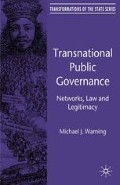Abstract
Sovereignty is one of the defining elements of statehood (Grewe 2000: 166–7). It renders the state operational — both domestically and internationally. Domestically, the state holds the monopoly on the legitimate use of physical force and is legitimized and supported by the people (Weber 1978a: 56; Held et al. 2003: 45). Internationally, sovereignty determines the state’s capability to participate in international affairs and to create and be subject to international law (Oeter 2002: 283; Morgenthau 1973: 309). In fact, modern international law rests on the concept of the sovereignty of states (Kimminich 1976: 97; Bleckmann 1995: 89ff.).
Access this chapter
Tax calculation will be finalised at checkout
Purchases are for personal use only
Preview
Unable to display preview. Download preview PDF.
Author information
Authors and Affiliations
Copyright information
© 2009 Michael J. Warning
About this chapter
Cite this chapter
Warning, M.J. (2009). The Changing State. In: Transnational Public Governance. Transformations of the State. Palgrave Macmillan, London. https://doi.org/10.1057/9780230244818_2
Download citation
DOI: https://doi.org/10.1057/9780230244818_2
Publisher Name: Palgrave Macmillan, London
Print ISBN: 978-1-349-31030-2
Online ISBN: 978-0-230-24481-8
eBook Packages: Palgrave Political & Intern. Studies CollectionPolitical Science and International Studies (R0)

